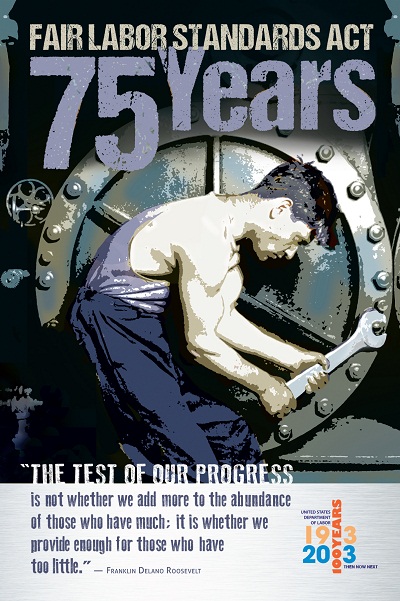Seventy-five years ago today, during one of his fireside chats, President Franklin Roosevelt spoke about the Fair Labor Standards Act, calling it one of "the most far-reaching ... far-sighted program[s] for the benefit of workers ever adopted."
Roosevelt signed the bill the next day, setting the nation's first federally mandated minimum wage at 25 cents an hour and establishing bedrock labor protections that have kept our middle class strong and workers secure for decades. No longer could employers impose punishing working conditions at what FDR had called "starvation wages." FLSA also included the nation's first major restrictions on child labor and introduced the concept of premium pay for overtime work - if you worked more than the standard 44-hour workweek (later reduced to 40 hours), you were entitled to time-and-one-half pay.
FDR called out critics of the measure. He urged Americans to ignore the "calamity-howling" of those who "tell you that a wage of $11 a week is going to have a disastrous effect on all American industry."
This was the thick of the Great Depression -- unemployment was a staggering, unimaginable 19 percent at the time, and the critics were certain a minimum wage would make it worse. But a funny thing happened after FLSA became law -- wages and employment increased. The calamity howlers, with their dire warnings of economic Armageddon, were wrong.
Three-quarters of a century later, another president wants to reward an honest day's work with an honest day's pay. President Obama has proposed an increase in the federal minimum wage from $7.25 per hour to $9 per hour. As he said in this year's State of the Union address: "In the wealthiest nation on Earth, no one who works full-time should have to live in poverty."
The president's plan would increase the income of 15 million Americans. And after 2015 it would, for the first time ever at the federal level, index the minimum wage to the cost of living so that its value can't erode over time. Minimum-wage families will be able to keep up with the rising cost of gas, groceries and other basic necessities.
Enter, or re-enter, the calamity howlers. They insist, despite the evidence to the contrary, that more take-home pay for low-wage workers will somehow trigger a massive hemorrhaging of jobs followed by an economic tailspin. Their record of unrealized doomsday predictions is reminiscent of the Mayan calendar.
Since the original enactment of FLSA, Congress has acted on nine occasions to raise the minimum wage 22 times. Congresses led by New Dealer Sam Rayburn and Contract with America architect Newt Gingrich have passed it. Democratic and Republican presidents alike -- FDR and Eisenhower, Bill Clinton and George W. Bush -- have signed it. The republic didn't fall. Civilization survived. The sun rose in the east every morning without fail.
In fact, study after study from independent economists has found that a higher minimum wage has little to no negative effect on employment. And over time, real GDP per capita has steadily increased, even when the minimum wage has been raised.
A higher minimum wage provides a shot in the arm to an economy powered above all by consumer demand. When working families have more money in their pockets, they don't stash it in offshore bank accounts in the Cayman Islands. They pump it back into their local economies, buying goods and services and helping small businesses grow, particularly in low-income communities. No wonder a recent poll found that two-thirds of small businesses favor raising the minimum wage. Their customers will have more money to spend.
Business support for the minimum wage was evident in 1938, too. Even as FDR singled out some businesspeople as calamity howlers, he hastened to add: "Fortunately for business as a whole, and therefore for the Nation, that type of executive is a rarity with whom most business executives most heartily disagree."
But there's really no argument that can substitute for the stories of the workers and families who will benefit from a higher minimum wage. Since February, I have traveled around the country meeting workers for whom the minimum wage increase is not a policy abstraction or a point of ideological purity. For them, it is a question of daily survival.
In 14 cities, from Philadelphia to Phoenix, from Akron to Atlanta, workers shared with me powerful stories of struggle and sacrifice. They face wrenching decisions every day: Do I fix the car that gets me to work or the furnace that heats my family's home? They know what it's like to lay awake at night, sick with worry over whether the electricity will be turned off tomorrow or the rent will go up again.
In Tampa, I spoke with a single mother named Gail who lost her husband two years ago. Her daughter has a disability, and Gail must sometimes choose between going to work to earn enough to support her daughter, and meeting with her daughter's teachers to make sure she gets an education plan tailored to her special needs. One night − one among many − all they could afford for dinner was a single hamburger, some french fries and two cups of water. "I would give my daughter the meat and the fries," she told me, "and I would eat the bread."
The Fair Labor Standards Act - and the minimum wage it guarantees - is a monument to the values embodied by Gail and millions like her - pride and dignity, hard work and personal responsibility. But we cannot let the wage floor it established fall so low that it no longer provides a basic level of economic security. Seventy-five years later, we must renew FLSA's promise. We must - as a matter of fundamental fairness to hardworking Americans, but also for the good of our economy - give minimum-wage workers the raise they deserve.